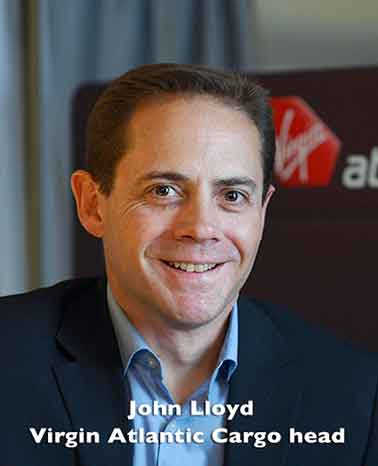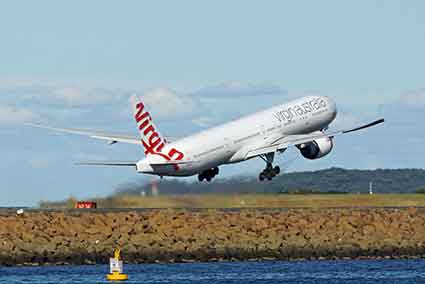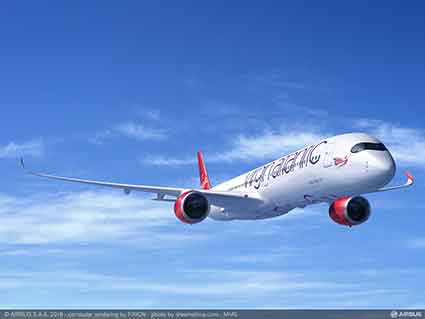INTERVIEW: A350 a game changer, and Heathrow expansion will deliver more routes, but it’s still ‘all about the customer’ as Virgin Atlantic celebrates 30 years
- News Feed
- Tuesday, 29 November 2016
 WHEN Virgin Australia Cargo launched in July 2015, its partnership with Virgin Atlantic Cargo for international long-haul cargo sales and management continued.
WHEN Virgin Australia Cargo launched in July 2015, its partnership with Virgin Atlantic Cargo for international long-haul cargo sales and management continued.
The Australian arrangement was just one of many Virgin Atlantic initiatives over a 30 year period as it fights for market share in an ever-competitive and challenging global market.
Today, Merren McArthur, Virgin Australia Cargo group executive says the Australia-based carrier still leverages Virgin Atlantic’s expertise and brand in the long-haul international air cargo market.
And for its part, Virgin Atlantic recently promoted account manager Phillippa (Pip) Palmer to be its new regional sales manager for Australia & New Zealand.
Virgin Atlantic Cargo head John Lloyd recently updated AirCargo AsiaPacific on upcoming challenges and changes to operations.
How much of the world does your Virgin Australia partnership cover?
Virgin Atlantic sells capacity on Virgin Australia’s services from Sydney and Brisbane to Los Angeles - and on the return sectors - and to and from Sydney and Abu Dhabi.
The partnership will extend further in 2017, when Virgin Australia launches new routes from Melbourne to Los Angeles and from Perth to Abu Dhabi.
These present a new opportunity to increase cargo’s contribution at a time when increased capacity coming into the Australian market is making it more competitive than ever.
 Have capacity issues changed in the recent past?
Have capacity issues changed in the recent past?
Basically, there’s a huge amount of capacity and not enough freight - and that’s forcing yields down year-on-year.
But 2016 has been unusual. We saw a positive upturn in July and August, for example, which are traditionally two of the weaker months of the year for cargo in Europe and across the Atlantic. We now are seeing a strong finish to the year, but it’s far from what I’d call a traditional peak season.
One growing trend into Australia is growth in the number of B2C e-commerce shipments as consumers buy more on line.
Does Virgin Atlantic still rely on Atlantic services for most of its revenues?
We still earn the bulk of our revenues on transatlantic routes. With JV partner Delta Air Lines, we now offer some 30 per cent of transatlantic cargo capacity. Existing routes serve Atlanta, Boston, Chicago, Detroit, Las Vegas, Los Angeles, Miami, Newark, New York, Orlando, San Francisco and Washington.
They will be joined by a new daily flight linking Heathrow and Seattle from March 2017. Virgin Atlantic will also commence flights from Manchester to JFK, Boston and San Francisco next year. The airline’s on-line network also extends across the Caribbean and Mexico and we also have healthy cargo routes to Hong Kong and China, India, Dubai, Nigeria and South Africa.
Do you have big plans for an expanded London Heathrow (assuming the parliamentary vote goes through next year and we eventually see an additional runway)?
We see new opportunities coming from the UK’s decision to build a third runway at Heathrow Airport. We think the move is a once in a generation opportunity to radically transform airline competition at the UK’s hub airport, where the lack of available slots has limited the number of destinations we can serve.
Are you actively involved in the airport’s expansion?
We have promised to work with Heathrow, the UK’s Civil Aviation Authority and the Government to ensure the final scheme is affordable, cost-efficient and ‘delivers for our customers.’
What’s the official view on the UK’s exit from the EU (Brexit)?
The impact of Brexit is the big question for all UK-based companies. Our challenge now is to take advantage of the opportunities presented by Brexit.
We have called on the UK Government to assume full control of aviation policy to enhance the international competitiveness of UK aviation for customers, businesses and the economy.
Vital to this will be protecting the current level of access with the USA, the UK’s largest single export market.
The main impact is going to be around exchange rates and how this impacts demand for products.
The fall in the value of sterling is having the effect you might expect, increasing demand for UK exports but causing headwinds for UK imports, notably from the US.
The speed of movement in the currency markets also is a challenge. Right now that may be being immunised by hedging, so we just have to keep an even closer eye on everything.

Any new fleet changes?
Virgin continues to make significant investments to achieve service and cost improvements. Having already commenced a fleet renewal program with greener and more efficient Boeing 787-9 aircraft – we now have 13 in service – we have placed a US$4.4 billion order for 12 A350-1000 aircraft which will be delivered from early 2019.
The A350 promises a great new passenger experience, will be 30 per cent more fuel and carbon efficient and reduce the airline’s noise footprint by more than 50 per cent. It also means that by 2021, Virgin Atlantic will boast one of the world’s youngest, greenest and quietest fleets. For Virgin Atlantic Cargo, the A350 is set to become the best cargo aircraft in the fleet, delivering a significant improvement in lower deck cargo capacity of between 10 per cent and 22 per cent depending on configuration.
Any plans for new products?
We are not an airline that just keeps putting new products into the market because everyone else is doing so. We believe we are offering what our customers want; a simple, clear and appropriate range of products based on service and that are right for the market. Our new VP Sales, Steve Buckerfield, has spent his first few months with us visiting customers around the world and their feedback is that they know and support our Fast Ride, Must Ride, Just Ride, Cool Chain and VEX express courier products and our approach remains ‘absolutely valid’.
What we are doing is making sure our sales teams get to spend as much time as possible in front of our customers because that’s the best way to stay in touch with what they need. One initiative supporting this is our investment in a new Salesforce IT system to increase the effectiveness of the sales team. It also is expected to be a ‘game changer’ in 2017 in terms of the customer visibility it provides.
For us, staying close to our customers is the most important thing of all.










